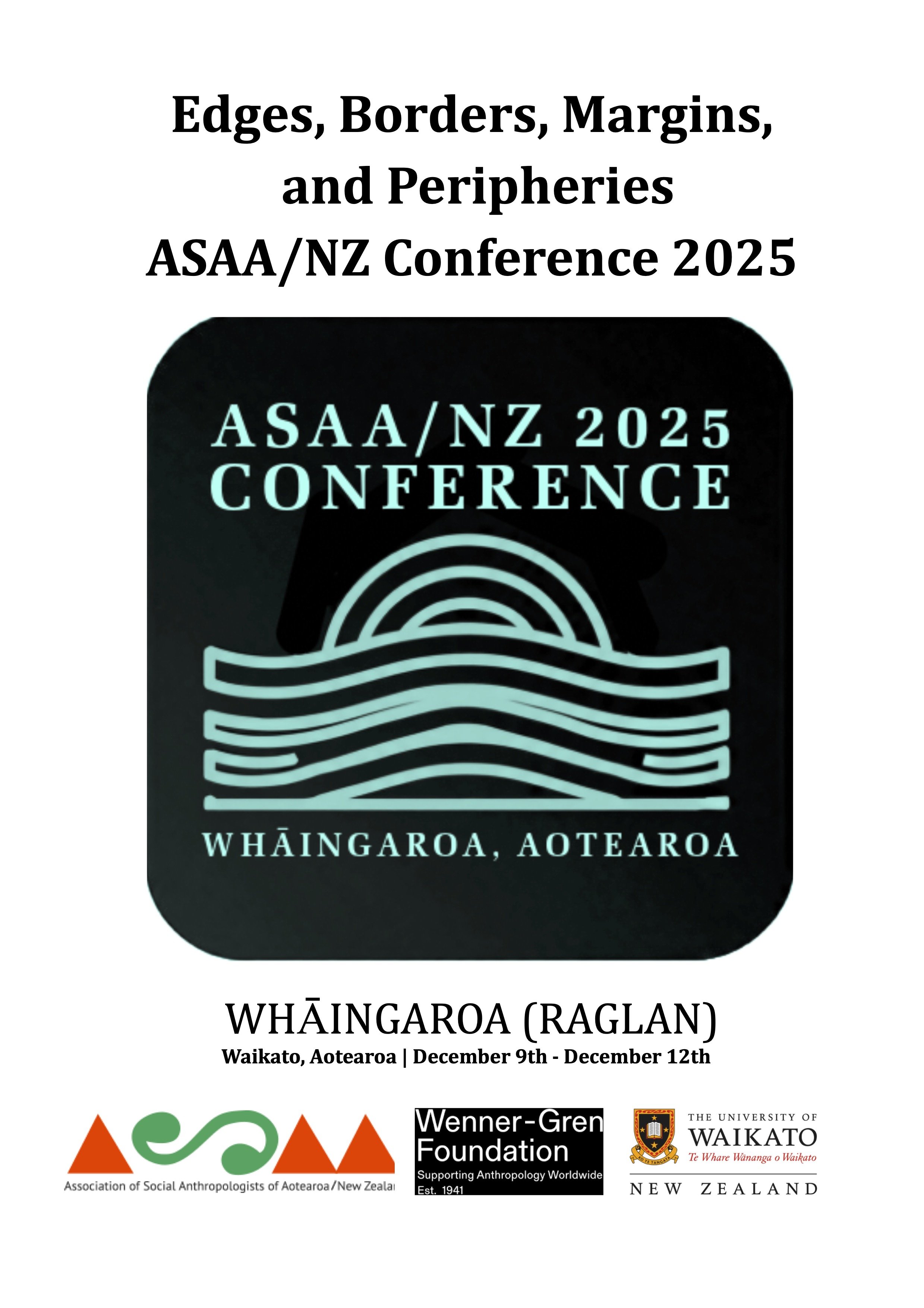2025 ASAA/NZ Conference:
Edges, Borders, Margins, and Peripheries
Whāingaroa (Raglan), Waikato, Aotearoa New Zealand
9-12 December 2025
We are pleased to announce that this year’s annual conference will be held on 9-12 December in Whāingaroa (Raglan), Waikato, Aotearoa New Zealand. 2025 marks 50 years since our association was formed and we look forward to welcoming you to this milestone event as we celebrate five decades of annual gatherings in Aotearoa.
Conference theme: Edges, Borders, Margins, and Peripheries
What role do edges, borders, margins, and peripheries play in shaping social and material worlds? What does it mean to do anthropology in a world where old models of cores and peripheries have been broken apart? How can peripheral anthropologies contribute to the unsettling of the discipline? In asking these questions, the 2025 ASAA/NZ conference aims to foment conversations around the sites, spaces, actors, and practices taking shape on the periphery to understand how they are actively making and remaking the contemporary world.
Anthropologists have long considered “remote and edgy” (Harms et al. 2014) places fertile for knowledge production, but we increasingly understand these edges as critical to the making of social, economic, and political orders. This mirrors the intensifying attention that boundaries attract from state and non-state actors, as evidenced by the fortification of many national and regional boundaries. It also reflects tensions in many urban peripheries, as migrants, private enterprise, and rural citizens struggle over social and physical space. From climate refugees in the Pacific to digital diasporas, from special economic zones to informal economies, edges, borders, margins, and peripheries emerge as key sites for understanding contemporary transformations.
Working from the antipodean perspective of Aotearoa New Zealand, we see the periphery as a space of active unsettling that has always been fertile for anthropological thinking. “Edges, Borders, Margins, and Peripheries” also asks: How do disciplinary traditions forged on the edges of empire help push anthropological research in new directions, and where might our edgy locations challenge anthropology to go next?
Conference Programme Booklet
Keynote Speaker:
Professor Tess Lea (Macquarie University)
Policy ecology, infrastructure and endurance
Buried within many descriptions of anthropogenic apocalypse, in accounts of what an unchecked desire for extractive existence has imperilled beyond return, lie two key concepts: 1. Indigenous lifeworlds represent an alternative, an otherwise, that teaches us how to live more attuned to, more in harmony with, in good relations with, the non-human universe; and 2. The state needs to determine the policies and funding inducements and fines to reroute our techno-capital regimes into eco-friendly, ‘sustainable’, modes and provide a decent blueprint for action. If written as a genuflection, the first concept positions Indigenous people as mnemonics for a possible otherwise, and as people who do not also have infrastructural needs. In the second framing, Indigenous people disappear within metropolitan imaginaries, while densely populated settlements continue to be nourished from margins, albeit through acts of kindness and repair. Using a framing of policy ecology, I revisit the ugliness of concrete and infrastructure, the messiness of policy and politics, to tether calls for action to a pragmatics of existence.
Professor Tess Lea is a socio-cultural anthropologist and Dean, School of Communication, Society and Culture, Macquarie University, Australia. Her research explores infrastructure, sewer pipes, roads, housing, and policy, as a means of exploring modes of existence in extractive worlds.
Keynote Speaker:
Dr April K. Henderson (Te Herenga Waka-Victoria University of Wellington)
Fielding Questions: Articulations and Disarticulations of Pacific Studies and Anthropology
Inspired by genuine curiosity and questions about fields-in-motion, this talk considers articulations and disarticulations between the interdisciplinary field of Pacific studies and the discipline of cultural anthropology as I've known and experienced them, and as others have written of them. I reflect on the interrelated histories of the two fields; review instances where Pacific studies has been named in discussions of the anthropology of Oceania, and where anthropology has been explicitly invoked in discussions of interdisciplinary Pacific studies; and survey the more extensive body of literature that critically interrogates anthropology’s relationships with Pacific peoples. Then, utilizing Teresia Teaiwa’s 2010 prescription for Pacific studies, I attempt to think through whether, where, and how palpable differences emerge between the prerogatives and practices of interdisciplinary Pacific studies and cultural anthropology of Oceania.
Dr April K. Henderson is a Senior Lecturer in Pacific Studies at Te Herenga Waka-Victoria University of Wellington. Her research focuses on the circulation of music, performing, and visual art forms between the US, Pacific Islands, and Aotearoa New Zealand to understand Pacific aspirations, representations, contexts and practices and to illuminate their political, economic, and social stakes.
Registration
Conference registration is now closed.
Registration rates are all in New Zealand dollars and include catered lunches and a conference dinner featuring Indian cuisine. Early Bird registration closed on 3 October 2025.
| Registration Type | Rate (in New Zealand dollars) |
|---|---|
| Virtual Registration* | 80 |
| Member Early Bird Registration | 350 |
| Member Full Registration | 375 |
| Student Early Bird Registration | 180 |
| Student Full Registration | 200 |
| Low-income/Retired Member Early Bird Registration | 180 |
| Low-income/Retired Member Full Registration | 200 |
| Non-member Full Registration | 400 |
| Day rate | 200 |








